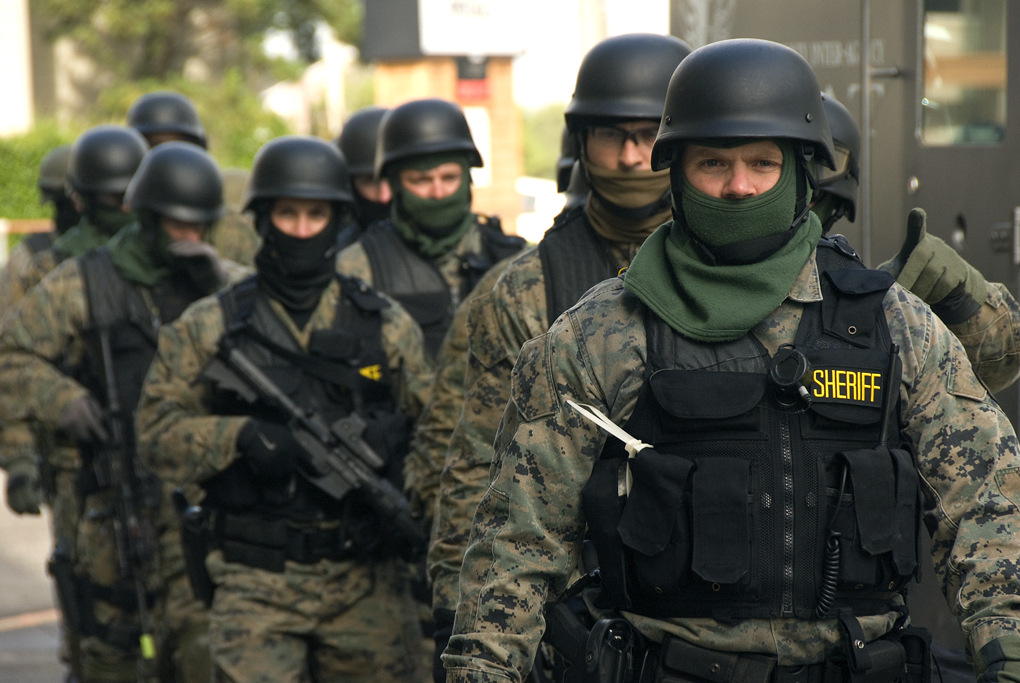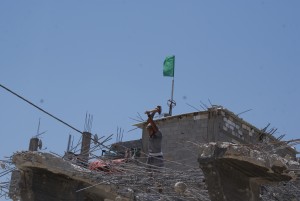Ending America’s arms race with… America
By Khaled Diab
America's addiction to weapons is destructive abroad and at home. Time to end this devastating arms race.

Wednesday 19 December 2018
“I am certain that, at some time in the future, President Xi and I,together with President Putin of Russia, will start talking about a meaningful halt to what has become a major and uncontrollable Arms Race,” tweetedDonald Trump.
This is not Donald Trump's most incoherent tweet – at least not at first sight. It is not even a hateful tweet. In fact, it seemingly holds out hope for a safer, more peaceful world. Nevertheless, it is bizarre and, though not a straight-out lie, it is misleading to the extreme.
If America is, indeed, in the throes of an arms race, it is locked in one against its longstanding arch rival… America.
The United States spends more than 2.8 times what second-ranked China spends on its military and as much as China, Russia, Saudi Arabia, India, France, the United Kingdom, and Japan combined, according to the National Priorities Project.
Moreover,the United States has been outspending the rest of the world for decades, meaning that Washington also possesses cumulative military superiority. This trend accelerated following the 11 September 2001 terrorist attacks, skyrocketing by 50% in the decade following 9/11.
What this means is that, if Trump were to successfully negotiate and conclude a disarmament accord with himself, Washington could easily halve its military expenditure without harming its military superiority – at least, not for the foreseeable future.
The scale of the resources America sinks into warcraft can be appreciated when one considers that Washington has spent an estimated $6 trillion on wars since 2001.To unpack that for you, that is $6,000,000,000,000.
That is an awful lot of zeros to expend on expending the lives of others, and to zero positive effect. To put that into context, that is the equivalent of almost three centuries of Afghanistan's minisicule GDP or 30 years of Iraq's larger national income.
If Washington had dropped those trillions in the form of cash bombs on Afghanistan and Iraq, it would have done a lot more for those two countries and for the US's national security interests than its invasions. Now imagine what kind of effect those kind of resources would have had had they been invested in targeted development projects. In fact, for 60% of the $6 trillion, the world could eliminate the most extreme forms of poverty in the world.
Even if such altruistic, universalist pursuits do not interest an ‘America First' US, imagine what the United States could have achieved on the domestic front with $6 trillion. For one, it could make Americans healthy again, while automatically improving the health of foreign citizens, by inoculating them against the transnational epidemic of American bombs.
The trillions spent on wars in distant lands could, for example, pay for a huge chunk of the single-payer, universal healthcare plan unveiled by Bernie Sanders, which would cost the state an estimated $1.3 trillion a year for a decade (as a bonus, universal healthcare would save the US economy $6 trillion within 10 years).
Those who wrongly believed Trump would be the ‘non-interventionist' president and those who believed his bashing of Clinton's warmongering was anything more than transparent political posturing and grandstanding, likely expected their saviour president would save on defence in his self-proclaimed effort to put his country first.
Despite Trump's sensible earlier position that the United States spends way too much on the military, the US president has not slashed military spending. Ever since he started his presidential campaign, Trump has constantly expressed his intention to beef up the armed forces.
The president has been boosting US military spending and aggressively bullying, even threatening, NATO allies to do the same, which appears to be an effort to sell them more US arms, rather than to reduce the financial burden on his country, as he claims.
Through the enormously lucrative exporting of arms, Washington (alongside Russia, France and the UK) is also helping escalate a devastating and destructive arms race in the Middle East. Not only is this flow of arms fuelling conflicts and wars across the region, especially in Yemen, Iraq and Gaza, it is also putting advanced weaponry in the hands of unstable and fragile regimes. As occurred with the Shah's regime in Iran or with ISIS in Iraq, this could lead to American weapons falling into the hands of hostile groups, undermining US interests and the security of its allies.
This deadly flood of US weapons is not just directed outwards, but increasingly being turned inwards. In recent decades, American policing has undergone immense militarisation,which is stoking police violence and brutality. Moreover, with more guns than people in the United States, the NRA and its supporters have facilitated a veritable and escalating arms race, not between nations, but between US citizens, with the right owning the lion's shareof the national arsenal.
Anxious about their slipping status, conservative white men, in particular,have been building up immense and rapidly growing stockpiles of guns as a phallic totem to regain their eroded sense of worth and‘masculinity', not only by protecting themselves and their families against the ‘bad guys' looming in the peripheries of their imaginations, but also, casting themselves as the ‘good guys', in a desperate attempt to unlock and unleash their inner hero.
These arsenals are bad news both for the far right's designated bad guys– including blacks, Jews, Muslims, LGBT communities and other minorities, not to mention the eternal target of male rage, women – but also for random citizens going about their business who get caught in the cross-fire of mass shootings. One oft-overlooked victim of the harrowing levels of gun violence in America is, with suicides accounting for two-thirds of firearms deaths, the gun owner.
What this shows is that restrictive gun ownership laws would not deprive conservative Americans, contrary to their paranoid convictions, of the means to defend themselves but would protect white people from the largest killer targeting them: white people.
As the above clearly demonstrates, gun and arms control are not just ethical issues for wish-washy, limp-wristed pacifists like myself. There is also a pragmatic, America-centric case for reining in the country's weapons addiction. It would save American lives abroad and at home, while freeing up astonishing amounts of wasted resources that could be used to improve the health, welfare and wealth of Americans.
A smaller American military and restricted US arms exports will have immediate beneficial effects for the rest of the world, as it will safeguard for people living in areas targeted by American arms the most fundamental right of all – the right to breathe.
Despite the clear gains for America and Americans, I won't hold my breath that unilateralist Donald Trump will unilaterally end America's unilateral arms race. There is just too much gain to be made from people's pain.
_______
This article was first published by The New Arab on 6 December 2018.


